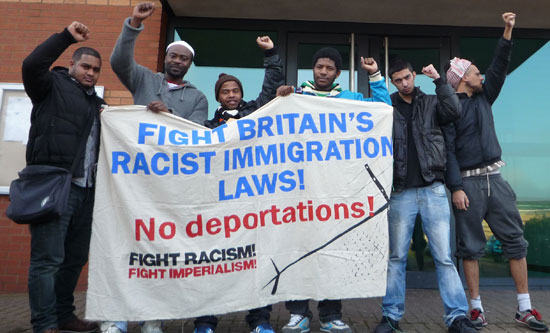
Two significant reports on race equality were published in October 2017: the government’s first release of data from a Race Disparity Audit, which combines data from a wide range of central government departments; and the Runnymede Trust’s Intersecting Inequalities: The impact of austerity on Black and Minority Ethnic women in the UK. TOM VICKERS reports.
The Audit was commissioned in August 2016, in response to a report by the Equality and Human Rights Commission, and following a wave of anti-racist protest across Britain. It is therefore an attempt by the government to be seen to be taking racism seriously, while channelling the discussion toward ‘equality of opportunity’ and away from any more far-reaching examination of the underlying issues. Runnymede’s Intersecting Inequalities goes further by pointing toward systematic discrimination on the grounds of race and gender, rather than just inequality, but because it does not attempt to explain the reasons such discrimination exists it offers little in the way of a strategy for change, beyond a wish list of policies.
In relation to employment and poverty, the Audit shows:
-
higher proportions of white adults are in work;
-
the only category that had a higher rate of employment than White British was the White Other group, reflecting the pressure on EU migrants, many of whom fall into this category, to leave the country if they cannot find work;
-
the lowest employment rates are for those who describe themselves as Black, Pakistani, Bangladeshi, or Mixed;
-
ethnic minorities are generally more likely to work in occupations defined as ‘low-skilled’ (and therefore low-paid and low-status);
-
people living in households headed by someone in the Asian, Black or Other category were more likely to be on a low income and more likely to be in poverty (50% of Bangladeshi, 46% of Pakistani, 40% of Black African/Caribbean, compared to 19% of White British households) – and more likely to be in persistent poverty (18% of Asian, 16% of Black, and 20% of the ‘Other’ category);
-
31% of Pakistani and 28% of Bangladeshi people live in the 10% most deprived neighbourhoods in England.
Intersecting Inequalities shows the impact of austerity in worsening these inequalities: on the basis of current and announced benefit cuts and tax changes, between 2010 and 2020 women in the poorest third of households will have their annual income cuts by an average of 19% if they are Asian, 14% if they are Black, and 11% if they are white. The report also calculates the impact of cuts to services in cash terms, representing a cut for the poorest 20% of households of 11.6% for Black households, 11.2% for Asian households, and 8.9% for White households.
These inequalities are part of a wider pattern of differential treatment by the British state, with examples cited by the audit including:
-
a higher proportion of Mixed, Black and Asian people were victims of crime in 2015/16 compared to the total population, but Black and Mixed adults also had lower levels of confidence in the police;
-
although rates for stop-and-search have fallen recently, they have fallen more slowly for ethnic minorities: overall ethnic minorities are three times more likely to be stopped and searched, and Black people are six times more likely;
-
ethnic minority people are one and a half times more likely to be arrested, and Black people three times more likely;
-
Black defendants, and particularly Black males, are less likely to be granted bail while awaiting trial;
-
Black Caribbean pupils are three times as likely to be permanently excluded from school as White pupils;
-
the removal of the Educational Maintenance Allowance in 2011 led to a particularly significant decrease in the participation of BME students in post-16 education;
-
Black people have relatively high rates of mental health problems but are less likely to receive treatment.
The Audit found that Indian, Pakistani, Bangladeshi or Chinese people are the least likely to report positive experiences of getting a GP appointment or of getting a GP, while Intersecting Inequalities reports increasing difficulties experienced by BME women trying to get GP appointments, with delays exacerbated by cuts in interpreting services, and increasing numbers of refusals by GPs to treat women who have no recourse to public funds because of their immigration status.
Both reports contain useful data but, for obvious reasons, they steer clear of asking fundamental questions about why such inequalities persist. The systemic nature of racism is hidden in the Audit through the inclusion of all sorts of unexplained comparisons, for example comparing the proportions of Black and Chinese pupils eligible for Free School Meals, giving the impression that inequality is regrettable but accidental. Intersecting Inequalities mentions the concentration of BME women in the poorest sections of society, but obscures the roots of Black women’s triple oppression under capitalism.
As we have written about previously, racism is the form which imperialism takes in the oppressor nation; any struggle against racism in Britain which does not struggle against British imperialism will inevitably fail because it leaves the basis of racism untouched. The crisis of imperialism is increasing the pressure on the working class and driving down living standards, particularly for its most oppressed sections, and leaves little room for concessions. Transforming this situation calls for a determined struggle against capitalism, not just for equality but for the liberation of the working class and oppressed.




